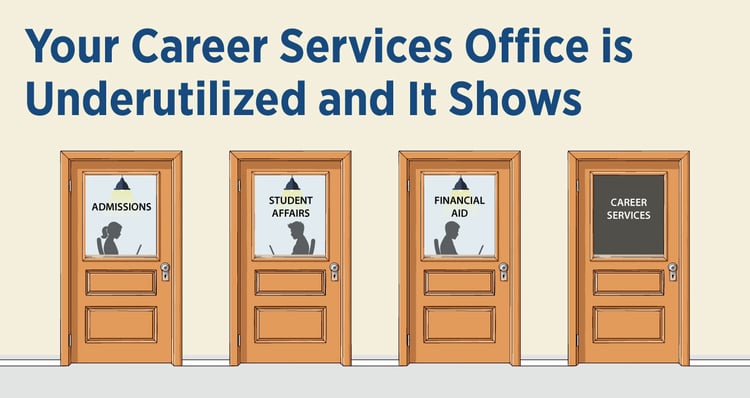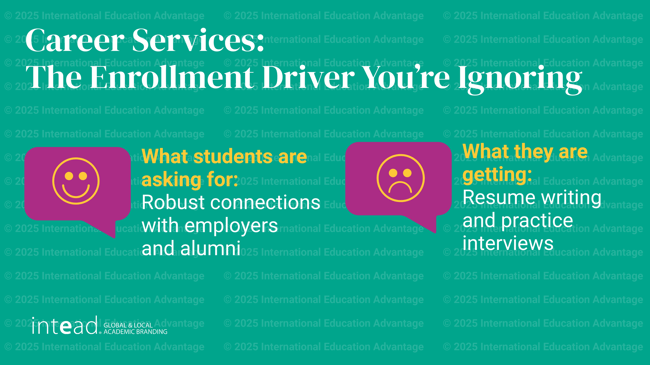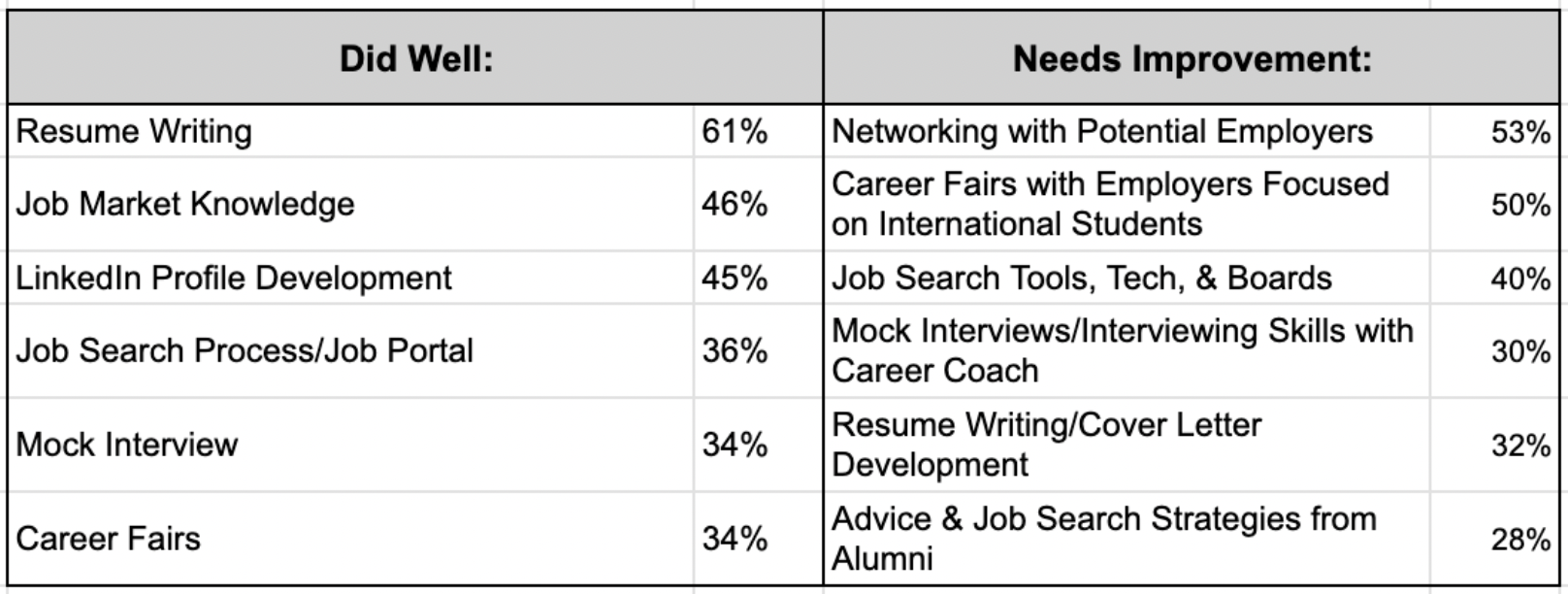
It’s well understood that future careers motivate students to pursue higher education. You could ask almost any student – domestic or international – whether career opportunities and outcomes influenced their decision to enroll, and the answer will be yes.
Take the 2024 State of Higher Education study by Lumina Foundation and Gallup. In it, 84% of respondents cited at least one employment-related reason for pursuing (or potentially pursuing) a degree or credential. Another Gallup study found that students who stopped out were less likely to be motivated by career goals (they were more motivated by general learning) – suggesting that career motivations don’t just drive enrollment – they support retention.
Meet Intead!
- Find us at AIRC in Atlanta in December, AIEA in DC in February, and ASU+GSV in San Diego in April. Be in touch to share a cup of coffee in person.
eBook Reboot: 88 Ways to Recruit International Students 2025 update. Your tactical toolkit for the year ahead. Covering all the bases in 10 quick-read chapters. Fosters great ideation discussions with your team.
Our own research on the preferences and motivations of international students aligns with this. We suspect your experience does, too. Broader media reports emphasize that domestic families and students are increasingly focused on career outcomes as the justification for the cost of university. International students and families always have been.
Where we are going with this: the more successful you are at getting students into the careers they want, the more successful you will be at getting students to fill the seats you want.
And yes, we know you’re already telling prospective students that “95% of your graduates get a job or continue on to an advanced degree after graduation.” That’s no differentiator if everyone is saying it, despite its accuracy.
This is where Career Services should chime in. Yet, many (read: most) students view Career Services through a lens of “why bother?” Hard to blame them. Help with resume and cover letter writing is too basic and can be provided by ChatGPT. Mock interviews have value, but there’s SO much more these departments could be doing to help students and your institution’s enrollment growth.
Read on for some interesting data points and our recommendations for improving Career Services with an eye on driving enrollment…
Hindsight is 20/20
Graduates who land jobs in their field of choice after graduation tend to feel more positive about the education they received. Those who don’t land those jobs, don’t. Simply stated: employed alumni are far more likely to recommend their alma mater.
Your institution produces so many potential advocates every year as your graduates find jobs. As we interview students and alumni, we consistently ask them how they feel about their institution. By and large they give high marks. We also ask if Career Services helped them. The typical answer there? “Not so much.”

If more of your grads recognize your institution’s role in helping them launch their careers, you’ll energize and expand this most credible alumni marketing force. Obvious? Sure. But check out the quick-hit research we did to confirm the value of this oft missed opportunity...
Working with our colleagues at Career Mosaic and FrogHire.ai, we conducted a survey of international alumni who graduated from US higher ed institutions to better understand their post-graduation experiences. The study explored their career outcomes and how it affects their ongoing affinity for their alma mater and their willingness to serve as advocates. Over 600 graduates responded. Among our questions, we asked whether their career outcomes influenced their likelihood to recommend their university.
67% of those who found a job after graduation said, “Yes, job success influenced their recommendation to others.”
Upon landing a new job, of those who shared their exciting news with others, 71% posted about it on social media. And at least two-thirds of those have more than 500 followers on their chosen platform.
Just a little perspective on the authentic, word-of-mouth brand building that happens when a university succeeds by doing right by their students. Do the math on this with all the grads you produce each year. The amount of free brand marketing here is big.
Not every graduate, of course, will share news about their job on social media, but those who do become powerful advocates. They tell your story across LinkedIn, Instagram, and TikTok. Each post, each share, each like is a free endorsement for your institution.
On an international scale, what we are looking for is the student who reaches their home country audience with a story like this: “my institution’s career services office connected me with three major computer science companies in Austin, and I landed one of them!”
That’s the kind of story that sticks.
So many of the Career Services teams we talk to focus most or all of their energy inward. Their mission is to serve the student. The easy-to-offer services of general career assessment, resume and cover letter writing, and mock interviews come naturally enough. And sure, there is a place for that.
Our survey asked international grads about their experience with Career Services. Here’s where they thought Career Services shined, and where it could use some polish:

What is so often missing from Career Services is the external focus putting energy into community and economic development. A Career Services team rarely considers themselves as working in the field of economic development for their local or national community. But that is exactly what they are. Building rock solid connections to employer HR leaders in the county, across the country, and around the globe makes so much sense.
Universities manufacture super smart, ambitious people. Companies drive production and innovation by hiring super smart ambitious people. Economic growth derives from super smart, ambitious people. For Career Services teams to focus inward on the student misses the ever so important connection between the university mission and economic growth locally, nationally, and internationally.
For more of our related research see:
- Our report produced through a partnership with NAFSA on employment trends and international students
- Our Connecting Dots report about the institutions creating international student career success produced with our partner FrogHire.ai
Let’s talk about what to do
Internal Focus: Is your Career Services team tracking alumni? Supporting them? Celebrating their successes publicly? Because these are the spokespersons you want – students who earned their degree at your institution, found a career, and went on to tell the world about it. Find these stories and get your comms team to pump them out. Collect the numbers.
External Focus: Provide the resume and cover letter workshop, obviously. But, what students really, really want and need are employers interested in them. More business partnerships. More targeted career fairs filled with employers. More meaningful introductions to alumni in specific jobs/industries.
It means leveraging alumni, reaching out to local employers, and building bridges to actual hiring opportunities everywhere they exist. There are so many sources of job trend data online to point your team in the right direction based on the program graduation rates at your institution.
You’ll likely need to advocate for a specific person or team of Career Service professionals focused on alumni development and corporate outreach. It is akin to a chamber of commerce role.
International is Not Just for the ISS Office
Notably, only 5% of our student/recent grad survey respondents said their Career Services office understood visa requirements for CPT, OPT, STEM OPT – knowledge areas central to international student career success if they hope to stay and work in the US. Serious missed opportunity here.
Bottom Line: If you invest in your Career Services department and empower that team to operate as a connector – not just counselor – you are helping students find jobs and employers find talent, while cultivating an alumni network that becomes your lifelong advocates.
Universities are economic development engines for communities across the country and around the world. They foster personal growth and economic growth at many levels. Career Service offices that have a broader view of their role and invest in the staff time that can deliver on what truly drives success (broad vision success) will build institutional brand and enrollment numbers.
There is so much untapped potential in how Career Services can shape career development for international students and domestic students.
Reach out to us. The Intead team has gathered and scrubbed loads of US Department of Labor data which includes how your specific institution is performing. We think you’ll find this interesting and informative. We can help you compare your outcomes to your peers. (A little bonus for our colleagues who actually read to the end of our posts ; -)
For ways to improve your career outcomes work, be in touch.



